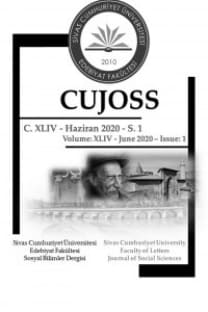Susan ve Lucy: Alan Ayckbourn’un İki Sıradışı Kadın-Kahramanı
Alan Ayckbourn (1939- ) yirminci yüzyıl İngiliz oyun yazarları arasında önemli bir yere sahiptir. Yazar çoğu kara-komedi türündeki oyunlarında duyarsızlık, iletişimsizlik, sevgisizlik, çatışma, yabancılaşma, ahlaksal yozlaşma gibi günümüz toplumsal sorunlarını özellikle kadın-kahramanları çevresinde ele alır. Woman in Mind’ın başkahramanı Susan ve Invisible Friends’in küçük kadın- kahramanı Lucy, yazarın sıradışı kadın-kahramanları arasındadır. Susan ve Lucy’nin Ayckbourn’un sahnesinden yansıyan yaşam deneyimleri kadının modern toplumdaki konumunu anlamak, ailevi ve toplumsal sorunlarını gözlemleyebilmek için önemlidir. Çünkü toplumsal sorumlulukları bulunduğuna inanan oyun yazarı kadınların dünyanın heryerinde ortak ailevi ve toplumsal sorunları olduğunu bilir ve oyunlarını bu evrensel sorunlardan yola çıkarak oluşturur. Bu çalışma da hem bir tiyatro ustası olan Alan Ayckbourn’u tanımaya hem de yazarın iki farklı oyununun kadın-kahramanları aracılığıyla kadınların değerlendirmeye olanak sağlar. günümüzde yaşadığı toplumsal sorunlardan bazılarını
Anahtar Kelimeler:
Alan Ayckbourn, oyun yazarı, toplum, kadın, kadınkahraman
Susan And Lucy: Two Outstanding Heroines Of Alan Ayckbourn / Susan ve Lucy: Alan Ayckbourn’un İki Sıradışı Kadın-Kahramanı
Alan Ayckbourn (1939- ) has an important place among the twentieth century British playwrights. The playwright handles some present-day social problems such as insensitiveness, lack of communication, lack of love, collision, alienation, moral degeneration especially around his heroines. Susan, the protagonist of Woman in Mind, and Lucy, the little heroine in Invisible Friends, are among the outstanding heroines of the playwright. The life experiences of Susan and Lucy reflected from the stage of Ayckbourn is considerable to understand the place of the woman in the modern society and to be able to observe social and familial problems of her. Because the playwright, who believes that he has social responsibilities, knows that the women all over the world have similar social and familial problems and he constructs his plays inspired by these global problems. This work provides to get to know both Alan Ayckbourn, a very experienced theatre man, and to evaluate some of the social problems of the women that they experience in present-day through the heroines of two different plays of the playwright.
Keywords:
Alan Ayckbourn, oyun yazarı, toplum, kadın, kadın-kahraman,
___
Ayckbourn, Allan. (1986). Woman in Mind, December Bee. London-Boston: Faber and Faber.--------------. (1991). Invisible Friends. London: Faber and Faber.
Allen, Paul. (2002). Alan Ayckbourn: Grinning at the Edge. New York: Continuum.
Almansi, Guido. (1984). Victims of Circumstance: Alan Ayckbourn’s Plays, in John Rusell Brown (Ed.), Modern British Dramatists: New Perspectives. London: Prentice Hall.
Billington, Michael. (1990) Alan Ayckbourn: Macmillan Modern Dramatists. Second edition, London: Macmillan.
Cornish, Roger and Violet, Ketels. (1986). The Plays of the Seventies, Landmarks of the Modern British Drama. Vol.2, London: Methuen London Ltd.
Elsom, John. (1981). Post-war British Theatre Criticism. London: Routledge and Keagan Paul.
Fisher, James. (1996). Alan Ayckbourn, British Playwrights, 1956-1995: A Research and Production Sourcebook. William Demastes (Ed.), London: Greenwood Press.
Holt, Michael. (1999). Alan Ayckbourn. UK, Northcote House.
Kalson, Albert E. (1993). Laughter in the Dark: The Plays of Alan Ayckbourn. Rutherford NJ.: Farleigh Dickinson University Press.
McAfee, Annalena. (1991). Alan’s Invisible Asset, Evening Standard, 8th March.
Rusinko, Susan. (1989). British Drama 1950 To The Present: A Critical History. Boston: Twayne Publishers.
Slover, T.W. (1993). The Evaluation of Domestic Themes in a Popular Style in the Plays of
Alan Ayckbourn, Unpublished PhDThesis, The University of Michigan.
Taylor, John Russell. (1978). The Second Wave: British Drama in the Sixties. London: Eyre Methuen.
Wandor, Michelene. (1993). Drama Today: A Critical Guide to British Drama 1970- 1990. London-New York: Longman.
Watson, Ian. (1988). Conversations with Ayckbourn. London-Boston: Faber and Faber.
Wu, Duncan. (1995). Six Contemporary Dramatists: Bennett, Potter, Gray, Brenton, Hare, Ayckbourn. London: St. Martin’s Press.
- ISSN: 1305-5143
- Yayın Aralığı: Yılda 2 Sayı
- Yayıncı: Sivas Cumhuriyet Üniversitesi Edebiyat Fakültesi
Sayıdaki Diğer Makaleler
TÜRKİYEDE EĞİTİM BİLİMLERİ ALANINDA YÜRÜTÜLEN LİSANSÜSTÜ EĞİTİME ULUSAL YETERLİLİKLER
AKADEMİK CAMİADA YURTTAŞLIK ALGISI ve BİLİNCİ: (CÜ ÖĞRETİM ÜYELERİ ÖRNEĞİNDE)
GEÇİM DERDİYLE AZ GELİŞMİŞ ÜLKELERİN COĞRAFİ MEKÂNA BAĞLI KALKINMA GİRİŞİMLERİ
Rüştü ILGAR, Jean Nicolas LEFILLEUL
OTOBİYOGRAFİK BELLEK VE OTOBİYOGRAFİK BELLEĞİ ETKİLEYEN DEĞİŞKENLER
KÖTÜMSERLİK VE MUTSUZLUK İZLEKLERİ ÇERÇEVESİNDE
Susan ve Lucy: Alan Ayckbourn’un İki Sıradışı Kadın-Kahramanı
